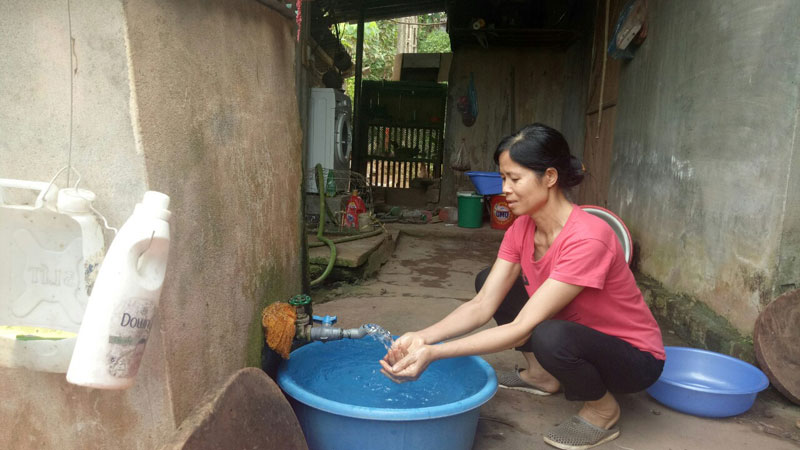
(HBO) - The loan program for the clean water and the environmental sanitation of the Bank for Social Policies (BSP), which has been implemented since 2005, has helped people improve their lives, especially in rural areas. From the end of September 2018, the Prime Minister has approved, increasing the maximum loan for the program from 6 million VND each project to 10 million VND for a project (each household can borrow capital for 2 construction works), better meeting the people's needs.

From the preferential capital of the Bank for Social
Policies, Ms. Bui Thi Ly's family in Day hamlet, Yen Lap commune (Cao Phong)
has been investing in building the clean water and sanitation works.
With the loans from the rural environment and sanitation,
thousands of households have invested in renovating, upgrading and building new
clean water and sanitation facilities to meet the national standards on
environmental protection and sanitation. These projects have made an important
contribution to improving the quality of rural sanitation, ensuring health and
improving the quality of life for people. The lending objects are not limited
to poor households and those who are under the preferential policies only. All
households living permanently or having permanent residence registration in
rural areas that do not have sanitation and sanitation facilities or have but
not reaching the national standards have been certified by the commune-level
People's Committee, they can borrow capital if necessary.
Mr. Vu Dinh Doai, the director of the provincial Bank for
Social Policies, says this is the fourth largest debit program in 20
preferential credit programs being implemented in the province. In fact, in
recent years, the credit program for the clean water and environmental
sanitation has contributed to improving the living conditions, health, quality
of life and the rural environmental sanitation for people, actively
participating in the criteria for the environment in the new rural
construction. By the end of July, in the whole province there have been 3,650
turns of borrowers with a loan turnover of over 66 billion VND, bringing the
total outstanding loans of the whole province to over 433 billion VND with
35,714 households with outstanding loans. From this source of capital, the
households have invested in construction of 7,969 clean water and sanitation
projects such as water tanks, water filter tanks, drilled wells, bathrooms and
septic toilets since the beginning of the year.
According to data from the Department of Agriculture and
Rural Development, in 2018, there were another 6.7 thousand rural households
using hygienic water, increasing the rate of rural households using clean water
to 91, 5% in the whole province. At the same time, there are another 6 thousand
households with hygienic latrines in the year, increasing the rate of the rural
households using hygienic latrines to 70%.
More than just an information technology teacher, Bui Van Nien is an inspiring figure who has nurtured the scientific curiosity and creative spirit of students in Vietnam’s ethnic minority communities.
Da Bac is the most disadvantaged mountainous district in Hoa Binh province, with ethnic minorities accounting for about 90% of its population. Over the past years, the district has mobilised resources to implement ethnic policies to improve the quality of life of local people.
In recent years, Hoa Binh province has consistently prioritised the protection, care, and education of children, particularly those from ethnic minorities and disadvantaged backgrounds, by creating a safe, healthy, and nurturing environment for their all-round development.
The Steering Committee for Tobacco Harm Prevention and Control of Hoa Binh province, in coordination with the Tobacco Harm Prevention and Control Fund, held a ceremony on May 28 in response to the World No Tobacco Day (May 31) and the National No Tobacco Week (from May 25 to 31). The event was chaired by Nguyen Van Toan, Standing Vice Chairman of the provincial People’s Committee and head of the Steering Committee.
Since 2021, the Center for Industrial Promotion and Industrial Development Consulting (CIIDC) under the Department of Industry and Trade has been implementing a school lighting model as part of the plan for using energy efficiently and economically in Hoa Binh Province in the pẻiod of 2021 - 2025. This model not only aims to improve the learning conditions and enhance the education quality, but it also promotes the message of energy saving, energy security, environmental protection and contributes to the goals of socio-economic development.
In the 2024 - 2025 school year, the entire Hoa Binh provincial education sector includes 520 educational institutions and schools. Among them are 13 ethnic boarding schools with 153 classes and 4,487 students. Four of these schools have met national standards, reaching 30.7 percent.



